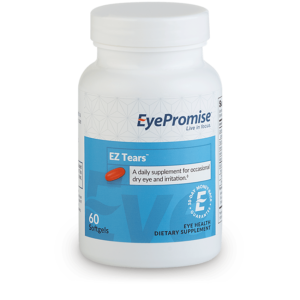DREAM Study May Be Misleading
Posted by EyePromise on May 1st 2018
It’s no question that Omega-3s have many health benefits. They’re good for heart, joint, and muscle health, but a recent study has put their benefits for eye health into question. Published on April 13 in the New England Journal of Medicine, the N-3 Fatty Acid Supplementation for the Treatment of Dry Eye Disease study states that participants taking Omega-3s did NOT have significantly better outcomes than the placebo. While this is true, this negative conclusion is an overstatement.
Don't Draw Conclusions from Headlines
Many of the articles that cover this study have negative headlines and titles. Most hang on the conclusion, saying that omegas weren’t effective. If you look at the results, the participants’ Ocular Surface Disease Index (OSDI) scores in the Omega-3 group significantly improved by the end of the trial. The conclusion should specify that the fatty acid improvements weren’t statistically significant compared to the placebo.
About the Study Placebo
The DREAM study used olive oil as the placebo. One definition of a placebo is “a substance that has no therapeutic effect, used as a control in testing new drugs.” Olive oil contains phytochemicals that have proven health benefits, or “therapeutic effect.” It’s also an important staple in a Mediterranean diet, which has been shown to reduce the risk of age-related eye health issues by 50%.
A “Real-World” Study
The study participants continued using other forms of relief throughout the course of the trial, including:
- Artificial tears
- Cyclosporine drops
- Warm lid soaks
- Lid scrubs or baby shampoo
- Additional Omega-3 supplementation (up to 1100 mg)
Including these management options blurs the line of what was effective during the study and what wasn't. To directly correlate Omega-3s with relief, patients should only supplement with those specific fatty acids.
ONIT vs. DREAM
EyePromise® believes that patients with occasional dry eye need more than Omega-3s but ignoring the many studies that prove they have a positive impact on eye health would be a miss. The Ocular Nutrition Impact on Tear Film (ONIT) Study utilized EyePromise EZ Tears™ and showed greater improvements for four of the measurements included in the DREAM study after one month. These measurements include:
- OSDI

- 40% improvement after 1 month with ONIT
- 31% improvement averaged between 6-12 months during DREAM
- Conjunctival Staining
- 28% improvement after 1 month with ONIT
- 13% improvement averaged between 6-12 months during DREAM
- Corneal Staining
- 41% improvement after 1 month with ONIT
- 15% improvement averaged between 6-12 months during DREAM
- TBUT
- 27% improvement after 1 month with ONIT
- 23% improvement averaged between 6-12 months during DREAM
Practitioners shouldn’t ignore the science, but consider looking beyond the headlines and diving in to the real results of scientific studies. Having an active placebo like olive oil and involving other remedies doesn't give a clear indication of the direct effectiveness of Omega-3s. This study shouldn't be used as a definitive conclusion, but as a springboard for further research into the ability of Omega-3s to relieve occasional dry eye.
Sources
- Asbell, Penny A. “DREAM Study: Omega-3 No Better than Olive Oil for Dry Eye.” Healio, Healio, 16 Apr. 2018, www.healio.com/optometry/cornea-external-disease/news/online/%7B98c2ab29-8ba6-4609-baef-d8e720f1b850%7D/dream-study-omega-3-no-better-than-olive-oil-for-dry-eye.
- Larkin, Howard. “Adding Omega-3 Has No Effect on Dry Eye Disease.” EuroTimes, European Society of Cataract and Refractive Surgeons, 23 Apr. 2018, www.eurotimes.org/dream-study-adding-omega-3-no-effect-dry-eye-disease/.
- “N-3 Fatty Acid Supplementation for the Treatment of Dry Eye Disease.” New England Journal of Medicine, 2018, doi:10.1056/nejmoa1709691.
- Cougnard-Grégoire A et al, Olive Oil Consumption and Age-Related Macular Degeneration: The Alienor Study, Plos One, 2016 July 28;11(7).
- S Toihir et al, Effects of vegetable oils on biochemical and biophysical properties of membrane retinal pigment epithelium cells, Canadian Journal of Physiology and Pharmacology, 2013, 91: 812–817 dx.doi.org/10.1139/cjpp-2013-0036.
